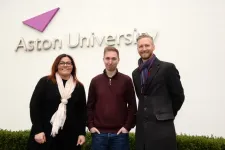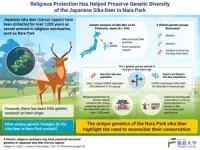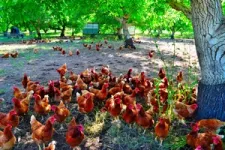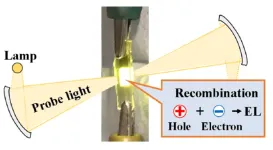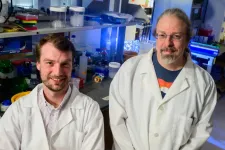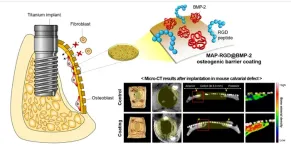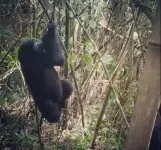(Press-News.org) Birmingham based charity, Help Harry Help Others and Aston University researchers, are working together to develop a pioneering pre-surgical diagnostic tool, which could see the eventual outcome of children with brain tumours drastically improve.
Help Harry Help Others, which became a registered charity in September 2012 and marked its 10th anniversary last year, was founded by Georgie Moseley, following the passing of her son Harry. Despite fighting an inoperable brain tumour, Harry raised over £750,000 for cancer research in the last two years of his life, before he passed away on 8th October 2011, aged just 11 years old.
Now, through the charity’s HelpCure initiative, Help Harry Help Others are pledging £36,000 worth of funding to support an Aston University PhD student at Aston Institute of Health and Neurodevelopment to complete their three years of study and research.
Timothy Mulvany, 24 will work with Dr Jan Novak, whose own study was funded in 2013 by Help Harry Help Others, before he went on to work as a postdoctoral researcher under Harry’s consultant, Professor Andrew Peet who is based at Birmingham Children’s Hospital.
Now a lecturer in Psychology at Aston University, Dr Jan Novak will supervise Timothy Mulvany as they focus on developing a tool that uses MRI data collected before surgery, in order to accurately diagnose the type of brain tumour a patient has. In doing so, medical teams can advise on the surgical tumour removal, helping to minimise unnecessary follow-up therapies and reduce the likelihood of long-term deficits that have devastating effects on patient health, education, and social development.
Dr Novak explains “Early, accurate diagnosis of brain tumours in children can drastically improve both survival and eventual outcome. Although medical imaging, including magnetic resonance imaging (MRI), is used to locate tumours prior to surgery, conclusive diagnosis is currently only possible via post-surgical testing. This post-surgical diagnosis limits the success of initial tumour removal. The development of a pre-surgical diagnostic tool has the potential for substantial clinical impact: it can improve surgical management, facilitate treatment planning, aid family discussions, minimise long-term impairments for patients, and reduce NHS costs associated with non-essential additional therapies.”
Part of Harry's mission was to raise funds to help research projects find a cure for brain tumours. Currently, research into brain tumours makes up just 1% of the national spend on cancer research and yet across the UK, more children and people under the age of 40 die of a brain tumour, than any other cancer. The Help Harry Help Others HelpCure initiative has so far provided over £240,000 worth of funding to research projects.
The research will be carried out at Aston Institute for Health and Neurodevelopment (IHN), a key research institute at Aston University which focuses on children’s health. IHN researchers have access to advanced neuroimaging and scanning facilities, to help facilitate the vast array of research being undertaken. The centre hosts Care Quality Commission registered clinical services, which help create a rich hub of opportunity for world-leading research and the education of young scholars. Members of IHN strive to generate world-leading translational neuroscience research.
Timothy, who previously studied maths and physics at University of Warwick, specialising along the astrophysics and computational path, said of his PhD funding, “I’m extremely eager and motivated to develop and utilise my existing knowledge, applying it in a way which will hopefully make a difference to children’s health. I hope to do everything I can in my research to improve the set of tools available when diagnosing children, and hopefully have a positive impact on the treatment they receive.”
Georgie Moseley of Help Harry Help Others concludes, “Continuing research into brain tumours is paramount if we are ever going to find a cure for this devastating disease. When my son Harry was ill and undergoing treatment, I was in awe of these fantastic individuals who were tirelessly looking after him and exploring new ways in which we could treat his tumour. Sadly, Harry passed in 2011, but his fight for winning the battle against cancer lives on through the charity. Being able to work with Aston University and help fund the next generation of doctors, consultants and professors in undertaking research, is just one way we can keep the hope for finding a cure alive. If Harry’s passing plays a part in a cure for brain tumours being found, then what a wonderful legacy.”
The charity will continue with its fundraising efforts to raise yearly funds towards the studentship programme, including the 2023 Birmingham Walkathon which will take place on Sunday 2nd April,.
For more information about Aston Institute of Health and Neurodevelopment please visit our website.
END
Help Harry Help Others and Aston University join forces to develop pioneering treatment of brain tumors in children
Local charity helps fund research to develop diagnostic tool for children with brain tumors
2023-03-14
ELSE PRESS RELEASES FROM THIS DATE:
Machine learning helps researchers separate compostable from conventional plastic waste with ‘very high’ accuracy
2023-03-14
Disposable plastics are everywhere: Food containers, coffee cups, plastic bags. Some of these plastics, called compostable plastics, can be engineered to biodegrade under controlled conditions. However, they often look identical to conventional plastics, get recycled incorrectly and, as a result, contaminate plastic waste streams and reduce recycling efficiency. Similarly, recyclable plastics are often mistaken for compostable ones, resulting in polluted compost.
Researchers at University College London (UCL) have published a paper in Frontiers ...
Observations open door to improved luminous efficiency of organic LEDs
2023-03-14
Electroluminescence is the production of light with an electrical current, without relying on heat or chemical reactions. This makes electroluminescent lights reliable and highly efficient: they are used as backlights in digital watches and in the displays of Apollo space shuttle guidance computers. Like OLEDs, light-emitting electrochemical cells (LECs)—which emit light through electroluminescence—have undergone many technological advancements. Close examination of the processes that lead to luminescence is essential ...
Rice labs seek RNA programming for ‘smart’ antibiotics
2023-03-14
HOUSTON – (March 13, 2023) – Synthetic biologists at Rice University are embarking on a three-year project to create “genetically encoded antibiotics,” strands of RNA that bacteria will readily copy and share that will selectively kill only disease-causing, pathogenic bacteria.
“Most bacteria pose no danger to human health,” said James Chappell, an assistant professor of biosciences and bioengineering at Rice. “The question for us as synthetic biologists is, ‘Can we create genetic programs that move through microbial communities and precisely remove only the bad actors from those communities?’”
Thanks ...
Attracting stem cells and facilitating bone regeneration by adhesive protein
2023-03-14
One of the key factors of success in a dental implant is the condition of the periodontium around the implant. A higher long-term success rate of dental implants requires sufficient and healthy alveolar bone. In those cases where lack of alveolar bone renders setting an implant difficult, the bone should be regenerated sufficiently to receive the implant, whether before or during the implant surgery. Development of osteogenic barrier coating material for implants by a Korean research team is expected to improve the success rate of alveolar bone grafting.
Three research teams led by Professor Hyung Joon Cha of the Chemical Engineering ...
Thousands of native plants are unphotographed, and citizen scientists can help fill the gaps
2023-03-14
Scientists have documented plant species for centuries to help us understand and protect the incredible diversity of flora in our world. But according to new research, many have never actually been photographed in their natural habitats – and that’s a problem.
Researchers from UNSW Sydney and the Australian Institute of Botanical Science, part of the Royal Botanic Gardens and Domain Trust, surveyed 33 major online databases of plant photographs to examine the photographic record of Australian plant species. The findings, published in New Phytologist, reveal out of 21,077 native Australian vascular plant species, almost 20 per cent lack a verifiable photograph.
Lead ...
Study sheds light on concerning new trend in drug advertising: Patient influencers
2023-03-14
Patients-turned-social-media-influencers routinely offer prescription drug advice to their followers and often have close ties with pharmaceutical companies, according to new University of Colorado Boulder research.
But they also tend to have good intentions, the study found.
The study, published this week in the Journal of Medical Internet Research, provides some of the first insights into the burgeoning, loosely regulated world of so-called “patient influencers,” sharing findings from 26 in-depth interviews about why and how they do it.
“The bottom line here is that patient influencers act as a form ...
Checking children’s wellbeing: Before and after COVID-19
2023-03-14
A video game featuring a mystical character named Rumble has helped Griffith University researchers investigate how school kids fared following lockdown disruption.
Dr Jacqueline Allen from Griffith’s School of Criminology and Criminal Justice headed up the team looking at self-reported wellbeing in a sample of primary school-aged children in Queensland, Tasmania and Western Australia.
The team used an innovative video game called Rumble’s Quest, developed wholly within Griffith University, which measures the four key facets of wellbeing, as well as ...
Health: Mediterranean diet associated with decreased risk of dementia
2023-03-14
Consumption of a traditional Mediterranean-type diet – rich in foods such as seafood, fruit, and nuts – is associated with a reduced risk of dementia, reports a study published in BMC Medicine. Individuals with a higher adherence to a Mediterranean diet had up to 23% lower risk for dementia compared with those who had lower adherence to a Mediterranean diet.
Diet may be an important modifiable risk factor for dementia that could be targeted for disease prevention and risk reduction but previous studies exploring the impact of a Mediterranean diet have typically been limited to small sample ...
Dizzy apes provide clues on human need for mind altering experiences
2023-03-14
Great apes spinning behaviours could provide clues about the role of altered states for the origins of the human mind.
Online videos observed great apes spin themselves to deliberately make themselves dizzy.
Researchers say these new findings suggest that the behaviour could be used to understand when humans evolved the desire to seek altered mental states and actively manipulate their mood and perception of reality.
Great apes deliberately spin themselves in order make themselves dizzy, academics at the University ...
Mediterranean diet associated with decreased risk of dementia
2023-03-14
Eating a traditional Mediterranean-type diet – rich in foods such as seafood, fruit, and nuts – may help reduce the risk of dementia by almost a quarter, a new study has revealed.
Experts at Newcastle University found that individuals who ate a Mediterranean-like diet had up to 23% lower risk for dementia than those who did not.
This research, published today in BMC Medicine, is one of the biggest studies of its kind as previous studies have typically been limited to small sample sizes and low numbers ...
LAST 30 PRESS RELEASES:
Of crocodiles, counting and conferences
AERA announces 2026 award winners in education research
Saving two lives with one fruit drop
Photonic chips advance real-time learning in spiking neural systems
Share of migratory wild animal species with declining populations despite UN treaty protections worsens from 44% to 49% in two years; 24% face extinction, up 2%
One in 20 babies experiences physical abuse, global review finds
Tundra tongue: The science behind a very cold mistake
Targeting a dangerous gut infection
Scientists successfully harvest chickpeas from “moon dirt”
Teen aggression a warning sign for faster aging later in life
Study confirms food fortification is highly cost-effective in fighting hidden hunger across 63 countries
Special issue elevates disease ecology in marine management
A kaleidoscope of cosmic collisions: the new catalogue of gravitational signals from LIGO, Virgo and KAGRA
New catalog more than doubles the number of gravitational-wave detections made by LIGO, Virgo, and KAGRA observatories
Antifibrotic drug shows promise for premature ovarian insufficiency
Altered copper metabolism is a crucial factor in inflammatory bone diseases
Real-time imaging of microplastics in the body improves understanding of health risks
Reconstructing the world’s ant diversity in 3D
UMD entomologist helps bring the world’s ant diversity to life in 3D imagery
ESA’s Mars orbiters watch solar superstorm hit the Red Planet
The secret lives of catalysts: How microscopic networks power reactions
Molecular ‘catapult’ fires electrons at the limits of physics
Researcher finds evidence supporting sucrose can help manage painful procedures in infants
New study identifies key factors supporting indigenous well-being
Bureaucracy Index 2026: Business sector hit hardest
ECMWF’s portable global forecasting model OpenIFS now available for all
Yale study challenges notion that aging means decline, finds many older adults improve over time
Korean researchers enable early detection of brain disorders with a single drop of saliva!
Swipe right, but safer
Duke-NUS scientists identify more effective way to detect poultry viruses in live markets
[Press-News.org] Help Harry Help Others and Aston University join forces to develop pioneering treatment of brain tumors in childrenLocal charity helps fund research to develop diagnostic tool for children with brain tumors
